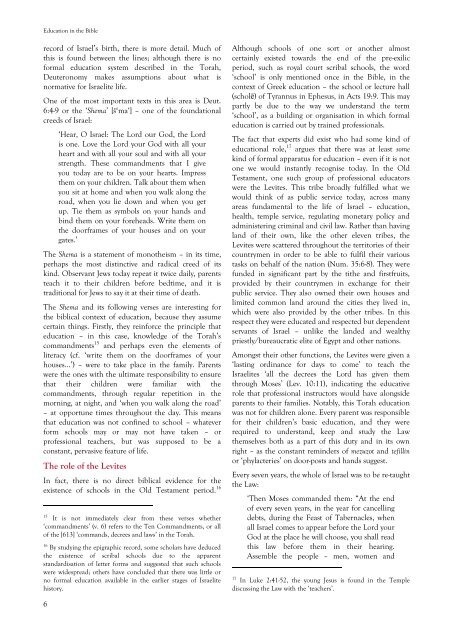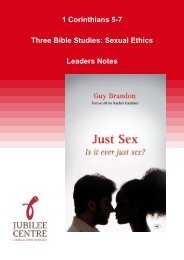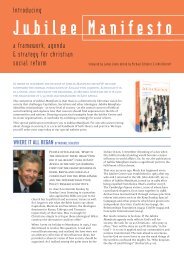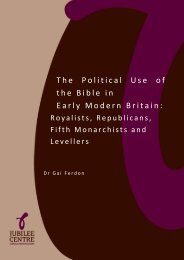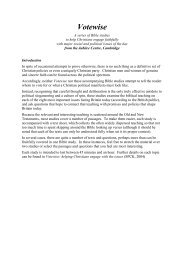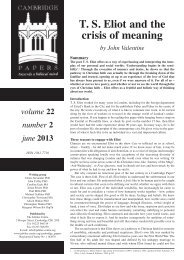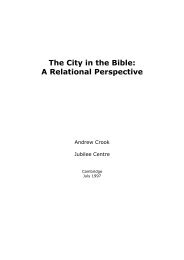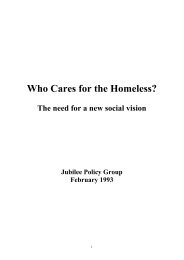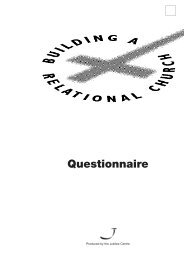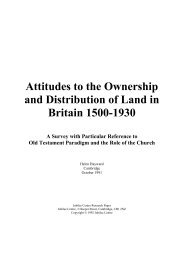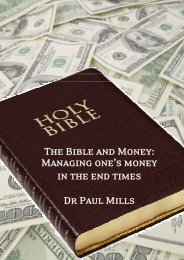Education in the Bible - Jubilee Centre
Education in the Bible - Jubilee Centre
Education in the Bible - Jubilee Centre
Create successful ePaper yourself
Turn your PDF publications into a flip-book with our unique Google optimized e-Paper software.
<strong>Education</strong> <strong>in</strong> <strong>the</strong> <strong>Bible</strong><br />
record of Israel’s birth, <strong>the</strong>re is more detail. Much of<br />
this is found between <strong>the</strong> l<strong>in</strong>es; although <strong>the</strong>re is no<br />
formal education system described <strong>in</strong> <strong>the</strong> Torah,<br />
Deuteronomy makes assumptions about what is<br />
normative for Israelite life.<br />
One of <strong>the</strong> most important texts <strong>in</strong> this area is Deut.<br />
6:4-9 or <strong>the</strong> ‘Shema’ [š e ma‘] – one of <strong>the</strong> foundational<br />
creeds of Israel:<br />
‘Hear, O Israel: The Lord our God, <strong>the</strong> Lord<br />
is one. Love <strong>the</strong> Lord your God with all your<br />
heart and with all your soul and with all your<br />
strength. These commandments that I give<br />
you today are to be on your hearts. Impress<br />
<strong>the</strong>m on your children. Talk about <strong>the</strong>m when<br />
you sit at home and when you walk along <strong>the</strong><br />
road, when you lie down and when you get<br />
up. Tie <strong>the</strong>m as symbols on your hands and<br />
b<strong>in</strong>d <strong>the</strong>m on your foreheads. Write <strong>the</strong>m on<br />
<strong>the</strong> doorframes of your houses and on your<br />
gates.’<br />
The Shema is a statement of mono<strong>the</strong>ism – <strong>in</strong> its time,<br />
perhaps <strong>the</strong> most dist<strong>in</strong>ctive and radical creed of its<br />
k<strong>in</strong>d. Observant Jews today repeat it twice daily, parents<br />
teach it to <strong>the</strong>ir children before bedtime, and it is<br />
traditional for Jews to say it at <strong>the</strong>ir time of death.<br />
The Shema and its follow<strong>in</strong>g verses are <strong>in</strong>terest<strong>in</strong>g for<br />
<strong>the</strong> biblical context of education, because <strong>the</strong>y assume<br />
certa<strong>in</strong> th<strong>in</strong>gs. Firstly, <strong>the</strong>y re<strong>in</strong>force <strong>the</strong> pr<strong>in</strong>ciple that<br />
education – <strong>in</strong> this case, knowledge of <strong>the</strong> Torah’s<br />
commandments 15 and perhaps even <strong>the</strong> elements of<br />
literacy (cf. ‘write <strong>the</strong>m on <strong>the</strong> doorframes of your<br />
houses…’) – were to take place <strong>in</strong> <strong>the</strong> family. Parents<br />
were <strong>the</strong> ones with <strong>the</strong> ultimate responsibility to ensure<br />
that <strong>the</strong>ir children were familiar with <strong>the</strong><br />
commandments, through regular repetition <strong>in</strong> <strong>the</strong><br />
morn<strong>in</strong>g, at night, and ‘when you walk along <strong>the</strong> road’<br />
– at opportune times throughout <strong>the</strong> day. This means<br />
that education was not conf<strong>in</strong>ed to school – whatever<br />
form schools may or may not have taken – or<br />
professional teachers, but was supposed to be a<br />
constant, pervasive feature of life.<br />
The role of <strong>the</strong> Levites<br />
In fact, <strong>the</strong>re is no direct biblical evidence for <strong>the</strong><br />
existence of schools <strong>in</strong> <strong>the</strong> Old Testament period. 16<br />
15<br />
It is not immediately clear from <strong>the</strong>se verses whe<strong>the</strong>r<br />
‘commandments’ (v. 6) refers to <strong>the</strong> Ten Commandments, or all<br />
of <strong>the</strong> [613] ‘commands, decrees and laws’ <strong>in</strong> <strong>the</strong> Torah.<br />
16<br />
By study<strong>in</strong>g <strong>the</strong> epigraphic record, some scholars have deduced<br />
<strong>the</strong> existence of scribal schools due to <strong>the</strong> apparent<br />
standardisation of letter forms and suggested that such schools<br />
were widespread; o<strong>the</strong>rs have concluded that <strong>the</strong>re was little or<br />
no formal education available <strong>in</strong> <strong>the</strong> earlier stages of Israelite<br />
history.<br />
Although schools of one sort or ano<strong>the</strong>r almost<br />
certa<strong>in</strong>ly existed towards <strong>the</strong> end of <strong>the</strong> pre-exilic<br />
period, such as royal court scribal schools, <strong>the</strong> word<br />
‘school’ is only mentioned once <strong>in</strong> <strong>the</strong> <strong>Bible</strong>, <strong>in</strong> <strong>the</strong><br />
context of Greek education – <strong>the</strong> school or lecture hall<br />
(scholē) of Tyrannus <strong>in</strong> Ephesus, <strong>in</strong> Acts 19:9. This may<br />
partly be due to <strong>the</strong> way we understand <strong>the</strong> term<br />
‘school’, as a build<strong>in</strong>g or organisation <strong>in</strong> which formal<br />
education is carried out by tra<strong>in</strong>ed professionals.<br />
The fact that experts did exist who had some k<strong>in</strong>d of<br />
educational role, 17 argues that <strong>the</strong>re was at least some<br />
k<strong>in</strong>d of formal apparatus for education – even if it is not<br />
one we would <strong>in</strong>stantly recognise today. In <strong>the</strong> Old<br />
Testament, one such group of professional educators<br />
were <strong>the</strong> Levites. This tribe broadly fulfilled what we<br />
would th<strong>in</strong>k of as public service today, across many<br />
areas fundamental to <strong>the</strong> life of Israel – education,<br />
health, temple service, regulat<strong>in</strong>g monetary policy and<br />
adm<strong>in</strong>ister<strong>in</strong>g crim<strong>in</strong>al and civil law. Ra<strong>the</strong>r than hav<strong>in</strong>g<br />
land of <strong>the</strong>ir own, like <strong>the</strong> o<strong>the</strong>r eleven tribes, <strong>the</strong><br />
Levites were scattered throughout <strong>the</strong> territories of <strong>the</strong>ir<br />
countrymen <strong>in</strong> order to be able to fulfil <strong>the</strong>ir various<br />
tasks on behalf of <strong>the</strong> nation (Num. 35:6-8). They were<br />
funded <strong>in</strong> significant part by <strong>the</strong> ti<strong>the</strong> and firstfruits,<br />
provided by <strong>the</strong>ir countrymen <strong>in</strong> exchange for <strong>the</strong>ir<br />
public service. They also owned <strong>the</strong>ir own houses and<br />
limited common land around <strong>the</strong> cities <strong>the</strong>y lived <strong>in</strong>,<br />
which were also provided by <strong>the</strong> o<strong>the</strong>r tribes. In this<br />
respect <strong>the</strong>y were educated and respected but dependent<br />
servants of Israel – unlike <strong>the</strong> landed and wealthy<br />
priestly/bureaucratic elite of Egypt and o<strong>the</strong>r nations.<br />
Amongst <strong>the</strong>ir o<strong>the</strong>r functions, <strong>the</strong> Levites were given a<br />
‘last<strong>in</strong>g ord<strong>in</strong>ance for days to come’ to teach <strong>the</strong><br />
Israelites ‘all <strong>the</strong> decrees <strong>the</strong> Lord has given <strong>the</strong>m<br />
through Moses’ (Lev. 10:11), <strong>in</strong>dicat<strong>in</strong>g <strong>the</strong> educative<br />
role that professional <strong>in</strong>structors would have alongside<br />
parents to <strong>the</strong>ir families. Notably, this Torah education<br />
was not for children alone. Every parent was responsible<br />
for <strong>the</strong>ir children’s basic education, and <strong>the</strong>y were<br />
required to understand, keep and study <strong>the</strong> Law<br />
<strong>the</strong>mselves both as a part of this duty and <strong>in</strong> its own<br />
right – as <strong>the</strong> constant rem<strong>in</strong>ders of mezuzot and tefill<strong>in</strong><br />
or ‘phylacteries’ on door-posts and hands suggest.<br />
Every seven years, <strong>the</strong> whole of Israel was to be re-taught<br />
<strong>the</strong> Law:<br />
‘Then Moses commanded <strong>the</strong>m: “At <strong>the</strong> end<br />
of every seven years, <strong>in</strong> <strong>the</strong> year for cancell<strong>in</strong>g<br />
debts, dur<strong>in</strong>g <strong>the</strong> Feast of Tabernacles, when<br />
all Israel comes to appear before <strong>the</strong> Lord your<br />
God at <strong>the</strong> place he will choose, you shall read<br />
this law before <strong>the</strong>m <strong>in</strong> <strong>the</strong>ir hear<strong>in</strong>g.<br />
Assemble <strong>the</strong> people – men, women and<br />
17<br />
In Luke 2:41-52, <strong>the</strong> young Jesus is found <strong>in</strong> <strong>the</strong> Temple<br />
discuss<strong>in</strong>g <strong>the</strong> Law with <strong>the</strong> ‘teachers’.<br />
6


